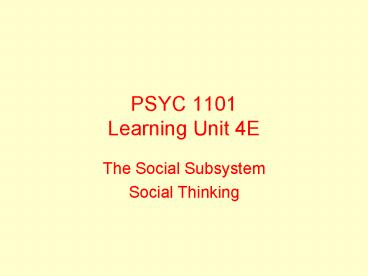PSYC 1101 Learning Unit 4E - PowerPoint PPT Presentation
1 / 14
Title:
PSYC 1101 Learning Unit 4E
Description:
Attribution Theory: Fritz Heider (1958) suggested that we have a tendency to ... Fritz Heider. Attributing Behavior to Persons or to Situations ... – PowerPoint PPT presentation
Number of Views:39
Avg rating:3.0/5.0
Title: PSYC 1101 Learning Unit 4E
1
PSYC 1101 Learning Unit 4E
- The Social Subsystem
- Social Thinking
2
Focuses in Social Psychology
We cannot live for ourselves alone.
Herman Melville
Social psychology scientifically studies how we
think about, influence, and relate to one another.
3
Social Thinking
- Does a persons absenteeism signify illness,
laziness, a stressful work atmosphere? - Was the horror of 9/11 the work of crazed evil
people or ordinary people corrupted by life
events.
- Social thinking involves thinking about others,
especially when they engage in doing things that
are unexpected.
4
Attributing Behavior to Persons or to Situations
- Attribution Theory Fritz Heider (1958) suggested
that we have a tendency to give causal
explanations for someones behavior, often by
crediting either the situation or the persons
disposition.
http//www.stedwards.edu
Fritz Heider
5
Attributing Behavior to Persons or to Situations
- A teacher may wonder think whether a childs
hostility reflects an aggressive personality
(dispositional attribution) or a reaction to
stress or abuse (a situational attribution).
Dispositions are enduring personality traits. So
if Joe is a quiet, shy and introverted child he
is likely to be like that in a number of
situations.
http//www.bootsnall.org
6
Fundamental Attribution Error
- The tendency to overestimate the impact of
personal disposition and underestimate the impact
of the situations in analyzing the behaviors of
others leads to fundamental attribution error.
We see Joe quiet, shy and introverted most of the
time but with friends and he is very talkative,
loud and extroverted.
7
Effects of Attribution
- How we explain someones behavior affects how we
react to it.
8
Attitude
- Belief and feeling that predisposes one to
respond in a particular way to objects, people
and events.
If we believe a person is mean, we may feel
dislike for the person and act unfriendly.
9
Attitudes Can Affect Action
- Our attitudes predict our behaviors imperfectly
because other factors including the external
situation also influence behavior.
Although Democrat leaders supported Bushs attack
on Iraq, under public pressure, they had their
private reservations.
10
Attitudes Can Affect Action and Actions Can
Affect Attitudes
- Not only do people stand for what they believe
attitude in, but they start believing in what
they stand for.
Cooperative actions can lead to mutual liking
(beliefs).
11
Small Request Large Request
- In the Korean war, Chinese communists solicited
cooperation from US army prisoners by asking them
to carry out small errands. By complying to small
errands they were likely to comply with larger
ones.
Foot-in-the-Door Phenomenon tendency for people
who have first agreed to a small request, to
comply later with a larger request.
12
Role Playing Affects Attitudes
- Zimbardo (1972) assigned the role of guards and
prisoners to random students and found that
guards and prisoners developed role appropriate
attitudes.
13
Actions Can Affect Attitudes
- Why do actions affect attitudes? One explanation
is that when our attitudes and actions are
opposed, we experience tension, called cognitive
dissonance.
To relieve us of this tension we bring our
attitudes closer to our actions (Festinger,
1957). Attitudes more often follow actions than
actions follow attitudes
14
Cognitive Dissonance































